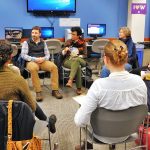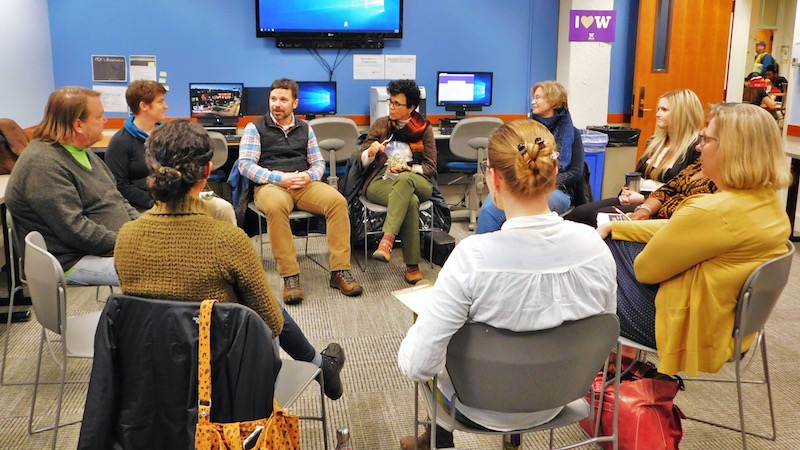UWT continues conversation after Women’s March
Recently, the topics of sexual harassment and violence have come to the forefront of many conversations with both the Women’s March and the popular hashtag #MeToo. UW Tacoma followed up with a discussion of the #MeToo and Time’s Up movements in the Real Talk series — a safe forum for students, staff and faculty to discuss prevalent topics — hosted by the Center for Equity and Inclusion Jan. 25. The conversation was led by new Social Justice Program Student Coordinator Robert Tacker.
“The conversation was lively and reflected the variety of experiences women have with sexual assault and harassment,” Tacker said.
Tacker chose this topic to discuss because of the prevalence in the current society and the work he has done around as an activist.
“[Choosing this topic] comes from my history as a feminist activist, work I have done in nonprofits that assist victims of domestic violence, and my excitement that this issue is finally causing real conversation about the prevalence of sexual harassment and assault in a variety of contexts,” Tacker said.
According to the #MeToo movement organization, since 1998 over 17,700,000 women have come forward and reported a sexual assault. Facebook feeds and timelines have been flooded over the past months with #MeToo, a movement created by Tarana Burke 10 years ago. The movement is a two word hashtag that embodies the commonality of sexual harassment and assault. Those who chose to speak out posted #MeToo as their status or captions to share that they also have been victimized in a sexual manner.
After dozens of women came forward across multiple industries regarding workplace sexual harassment, the Time’s Up initiative was created. Over 300 public figures signed an open letter published in The New York Times Jan. 1, calling attention to this issue and saying that “Time’s Up.” Their website explains the initiative as a “unified call for change from women in entertainment for women everywhere. From movie sets to farm fields to boardrooms alike, [they] envision nationwide leadership that reflects the world in which we live.”
Bonnie Becker, assistant chancellor for Strategy and Assessment, associate professor of marine ecology and attendee of the Real Talk session feels that discussing these topics in the Real Talk series is a “good opportunity to have deeper conversations with people across campus.”

Jan 21, the second annual Women’s March took place all over the world — locally in Seattle and Olympia — to gather and to march in solidarity. The Real Talk session took place the following week.
“I am sure the organizers picked this date to coincide with the Women’s March, to keep the topics timely and relevant. But this topic would still be so timely given what is going on in American society right now,” Becker said. “These events all build on each other […] but these problems have been around for a long, long time, and are suddenly being discussed with some seriousness in the media.”
A year into the Donald Trump presidency — and after a year of an outcry from sexual assault victims in the workplace and numerous industries — activists hope that the March will reignite passion to bring change. This women-led movement began in 2017 as the Women’s March on Washington with Unity Principles in Mind. The Unity Principles are a guiding force of the movement: ending violence, reproductive rights, LGBTQIA rights, worker’s rights, disability rights, immigrant rights and environmental justice.
Assistant Director of Student Engagement Elizabeth Hansen has attended both the 2017 Women’s March in Olympia and the Seattle 2018 Women’s March.
“Generally the feeling was very positive and uplifting,” Hansen said. “I witnessed a few counter-protestors, but the individuals were not met with hostility and the March security staff was always nearby to ensure there was not an incident.”
One of the CEI’s goals for their Real Talk series is to better inform UWT students and begin crucial conversations around campus. Hansen supports this, hoping that student’s time at the university is filled with new learning opportunities.
“College is a time for learning and discourse; we should all be challenging ourselves and others to learn more about topics we may not have as much knowledge and understanding about,” Hansen said.







